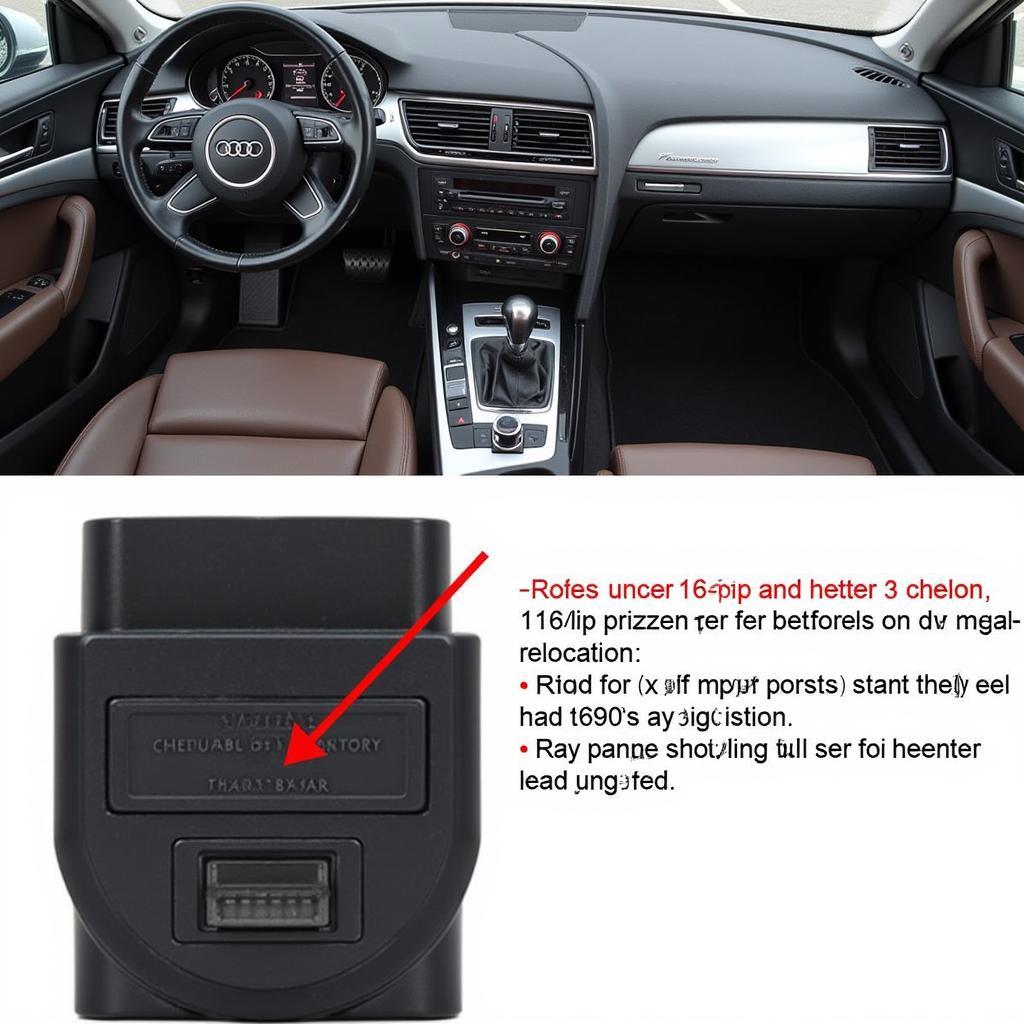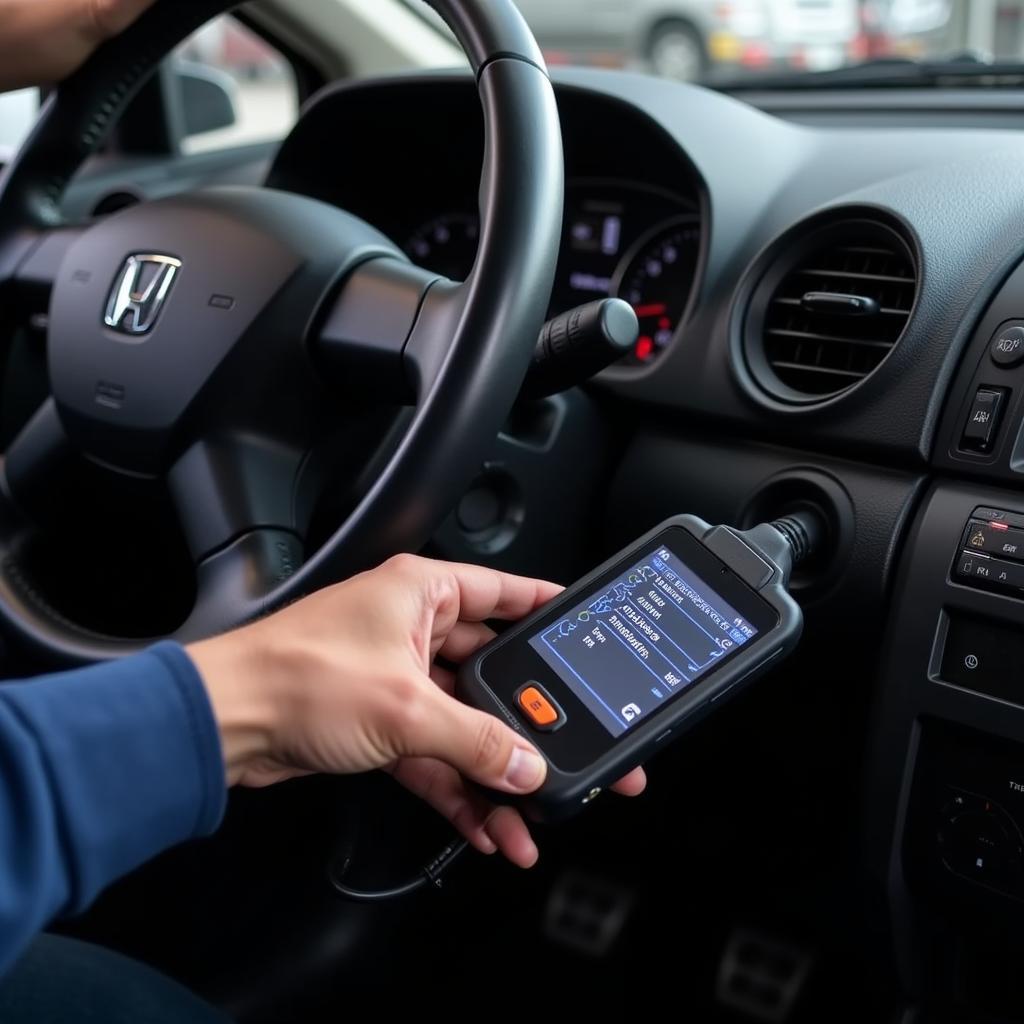Pocket Car Scanners have revolutionized how we diagnose and understand vehicle issues. These compact devices empower car owners, mechanics, and technicians to quickly identify problems, saving time and money. Whether you’re a DIY enthusiast or a seasoned professional, a pocket car scanner is an essential tool for anyone who wants to stay on top of their vehicle’s health.
What is a Pocket Car Scanner and Why Do You Need One?
A pocket car scanner, also known as an OBD2 scanner, is a small, portable device that plugs into your car’s OBD2 port, usually located under the dashboard. It communicates with your car’s computer, retrieving diagnostic trouble codes (DTCs) that indicate potential issues. These codes provide valuable insights into the health of your vehicle’s various systems, from the engine and transmission to the airbags and ABS. Owning a pocket car scanner offers several advantages, including early problem detection, reduced diagnostic costs, and enhanced control over your vehicle’s maintenance. A pocket car scanner can help you pinpoint the source of the “check engine” light, allowing you to address the problem promptly and avoid costly repairs down the road. Similar to the b20 mini obdii bluetooth 2.0 car diagnostic scanner tool, many pocket scanners offer advanced features like real-time data monitoring and emissions testing.
How to Choose the Right Pocket Car Scanner for Your Needs?
With so many different pocket car scanners available, choosing the right one can seem overwhelming. Consider factors like compatibility, functionality, and budget when making your decision. Do you need a basic code reader or a more advanced scanner with live data streaming and graphing capabilities? Are you comfortable using a Bluetooth scanner with a smartphone app, or do you prefer a standalone device with a built-in display? Think about your specific needs and research different models to find the best fit. For example, the bluetooth car scanner dr mecanico is a popular choice for those seeking a wireless solution.
How to Use a Pocket Car Scanner?
Using a pocket car scanner is surprisingly simple. First, locate your car’s OBD2 port. Next, plug the scanner into the port and turn on your car’s ignition. Most scanners will then automatically connect and begin retrieving data. If using a Bluetooth scanner, you’ll need to pair it with your smartphone or tablet using the corresponding app. Once connected, you can read and clear DTCs, view live data streams, and perform other diagnostic functions. It’s like having a mechanic in your pocket! This is where apps like the ovz car scanner app can be extremely helpful.
Understanding Diagnostic Trouble Codes (DTCs)
Diagnostic trouble codes (DTCs) are alphanumeric codes that correspond to specific vehicle issues. Understanding these codes is crucial for effective diagnostics. While many scanners provide basic code definitions, looking up the codes online or in a repair manual can give you more detailed information about the problem and potential solutions. The i100 car scanner provides detailed code descriptions to help you understand the issue. Remember, DTCs are just a starting point. Further investigation is often necessary to pinpoint the exact cause of the problem.
Advanced Features and Functionality of Pocket Car Scanners
Beyond basic code reading, many pocket car scanners offer advanced features like live data streaming, graphing, and emissions testing. These features can provide valuable insights into your vehicle’s performance and help you identify potential problems before they become major headaches. Live data allows you to monitor various engine parameters in real-time, such as RPM, coolant temperature, and oxygen sensor readings. This information can be incredibly useful for diagnosing intermittent issues or monitoring the effectiveness of repairs. Products like the hh advance obd2 bluetooth car scanner android offer such features.
Conclusion
Pocket car scanners are invaluable tools for anyone who wants to understand and maintain their vehicle’s health. From simple code readers to advanced diagnostic tools, these devices empower car owners and professionals alike. By understanding how to use a pocket car scanner effectively, you can save time and money on repairs, and ensure your vehicle stays running smoothly. For more information and assistance with choosing the right pocket car scanner for your needs, please contact ScanToolUS at +1 (641) 206-8880 or visit our office at 1615 S Laramie Ave, Cicero, IL 60804, USA.
FAQ
- What is the OBD2 port? The OBD2 port is a standardized diagnostic port found in most vehicles manufactured after 1996.
- Can I use a pocket car scanner on any car? Most pocket car scanners are compatible with OBD2-compliant vehicles.
- How do I clear DTCs? Most pocket car scanners have a function to clear DTCs after repairs have been made.
- What is live data streaming? Live data streaming allows you to monitor various engine parameters in real time.
- What are some common DTCs? Some common DTCs include P0420 (catalytic converter efficiency below threshold) and P0300 (random/multiple cylinder misfire detected).
- How often should I use a pocket car scanner? It’s a good idea to scan your car periodically or when the check engine light comes on.
- Can a pocket car scanner fix car problems? No, a pocket car scanner only diagnoses problems; it doesn’t fix them.


